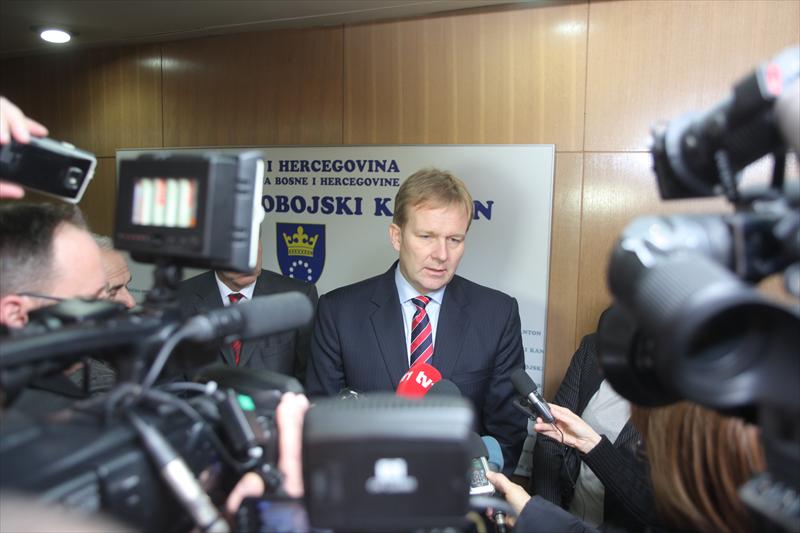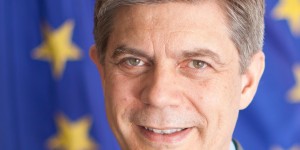Head of Delegation in BiH and EU Special Representative in BiH, Ambassador Peter Sorensen was a guest on the television station TV1. In his remarks, he said that the EU is involved in resolving implementation issues of the Sejdic-Finci ruling, and that the EU is ready to help political leaders to fulfil their commitments. “We are committed to the future of Bosnia and Herzegovina into the EU. We want Bosnia to join the EU,” emphasized Ambassador Sorensen.
TV1: Representatives of the EU Delegation to BiH began consultations with the political representatives on the implementation of the Sejdic-Finci ruling. Is this is an indication of a stronger EU presence in BiH?
Ambassador Sorensen: The signs of stronger engagement came already in 2011 when we enhanced our presence in BiH and when the EU Delegation to BiH became the largest EU Delegation in the world. The very fact that we are engaged in resolving this issue means that Brussels is concerned and willing to solve this problem and we are all willing to assist political leaders to fulfil their commitments. We are committed to the future of BiH. We want BiH to join the EU.
TV1: Does the EU have their proposal for the implementation of this ruling?
Ambassador Sorensen: What we are doing is facilitating a dialogue between the political parties. It is our obligation to help to identify whether there are some points that are common among all political parties in order to find a basis for the implementation of the European ruling. What we need to see and if the political leadership agrees on this issue, then further steps can be made on the path to EU membership. It is not up to me to assemble the documents for the political leaders, they must make their own, but what I can do is to facilitate a dialogue that would help them to reach an agreement over how the deal should look like.
TV1: Do you agree that all this is taking too long? That BiH is delaying for three years the implementation of the ruling? Are the local officials, in your opinion, aware of the consequences of delay?
Ambassador Sorensen: I agree that it is taking too long. I do not think you even need to know enough details to understand how long it is taking. Are they aware of it? Actually this is a question that they should be asked. According to the information we get from them, and what they tell us is that they are aware of it. Of course we are not naive. One thing is what you say and another what you do. What is important regarding this issue is what they will do in terms of implementation, rather than what they say.
TV1: Do you have the impression, according to the recent discussions on this topic, that our political leaders are a step closer to solving this problem?
Ambassador Sorensen: I have the impression, in fact the vast majority of them had given it a thought, they had enough time. In that sense I think their job is easier. But people have been in a situation that a stance was assigned to them and they did not deviate from it. But that’s not the way to run a country. Now I think they understand, and I think they all need to look for a solution, to achieve the minimum for all and that no one will get the maximum.
TV1: But if they do not reach an agreement soon and the ruling is not carried out in time, do you have a sanctioning mechanism for BiH due to the delay and will you use it?
Ambassador Sorensen: I’m often asked that question. We do not need to impose sanctions. Sanctions are already here. Actually the sanctions are that BiH is not moving forwards on its path towards the EU membership and the vast majority of citizens agree with us. There is a small percentage of people who do not know what to say about this, and a very small percentage of those who are not inclined towards the membership. However the vast majority of people would agree that BiH needs to go further on the path towards the EU membership. And in fact the consequences for the citizens are those that shall set in if this issue is not resolved.
TV1: Time passes when it comes to the progress of arrangement. Do you count on the leaders or the reaction of the citizens?
Ambassador Sorensen: You are right to put emphasis on the citizens. Actually, this is not about the leaders, this is for the citizens. Therefore politicians must not sacrifice citizens because of their personal agendas but must do what the majority wants. I’m not a pessimist. I believe that politicians understand and they have publicly committed to all the European institutions to solve this issue by the end of March. If they do not fulfil the obligations then it is a different story. But now I can only assume that they will do what they say.
TV1: The EU has agreed upon a budget for the next 7 years. How much money can BiH withdraw from the funds, and does it depend on the implementation of this ruling?
Ambassador Sorensen: Yes it’s true, we did adopt a framework for the budget from 2014 to 2020 and it amounts to 960 billion EUR. Now we’ll see how much of that money will be used for IPA. It is very clear that it is necessary to establish new BiH structures and it is necessary to establish the manner and willingness to distribute these funds. EU will not do the job for the leaders of this country. BiH institutions run this country and they will be held accountable for it. We do not know yet, it is too early to tell what the allocations will look like.
TV1: Will there be a new principle that all the countries, regardless of whether they are the applicants or potential candidates, will have access to all components of the IPA?
Ambassador Sorensen: Yes it’s true, that’s news. This is the new package. This time, all the components of pre-accession assistance will be available to countries regardless of their status in the EU integration process. However, what is important is that the country and the state have the channels, which will absorb these funds. BiH does not currently have a structure that would do the job. We have an element of structural funds, where BiH would have a direct access to these funds. But you do not have an internal structure that would be responsible for it. BiH leaders need to agree on what the structures should look like. Once this is established, then you will be able to consider how to use these funds.
TV1: How can one get the citizens as well as political leaders in BiH to bring the European agenda to the top of the priority list?
Ambassador Sorensen: The EU is based on the citizens and the citizens must make it their priority, and then those people chosen by the citizens must work in this direction. Something similar happened with the liberalization of the visa regime, when people said they wanted liberalization, the politicians responded positively. I think it’s a positive agenda for the EU. We saw benefits in all the countries that have been the subject of enlargement. It is very important that the citizens, the media, NGOs are involved. Broad involvement of all segments of society is important. It is not just up to the Delegation but up to all the politicians. That is where the starting point should be. According to the surveys we see that people in BiH want to see this happen. It remains to be seen whether the political leaders shall respond positively to this request.




